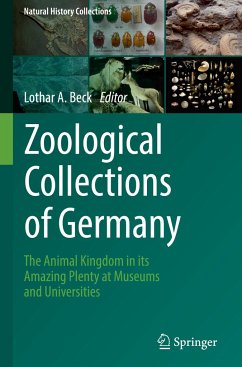Zoological Collections of Germany
The Animal Kingdom in its Amazing Plenty at Museums and Universities
Herausgegeben:Beck, Lothar A.
Zoological Collections of Germany
The Animal Kingdom in its Amazing Plenty at Museums and Universities
Herausgegeben:Beck, Lothar A.
- Gebundenes Buch
- Merkliste
- Auf die Merkliste
- Bewerten Bewerten
- Teilen
- Produkt teilen
- Produkterinnerung
- Produkterinnerung
This book is devoted to the knowledge of up to 250 years of collecting, organizing and preserving animals by generations of scientists. Zoological Collections are a huge resource for modern animal research and should be available for national and international scientists and institutions, as well as prospective public and private customers. Moreover, these collections are an important part of the scientific enterprise, supporting scientific research, human health, public education, and the conservation of biodiversity. Much of what we are beginning to understand about our world, we owe to the…mehr
Andere Kunden interessierten sich auch für
![Jesuit Contribution to Science Jesuit Contribution to Science]() Agustin UdiasJesuit Contribution to Science38,99 €
Agustin UdiasJesuit Contribution to Science38,99 €![Das fundamentale Geschlecht Das fundamentale Geschlecht]() Norbert KlugeDas fundamentale Geschlecht64,80 €
Norbert KlugeDas fundamentale Geschlecht64,80 €![International Handbook of Research in History, Philosophy and Science Teaching International Handbook of Research in History, Philosophy and Science Teaching]() International Handbook of Research in History, Philosophy and Science Teaching650,99 €
International Handbook of Research in History, Philosophy and Science Teaching650,99 €![Fächerübergreifender Grundschulunterricht Fächerübergreifender Grundschulunterricht]() Fächerübergreifender Grundschulunterricht60,45 €
Fächerübergreifender Grundschulunterricht60,45 €![Science Education: A Global Perspective Science Education: A Global Perspective]() Science Education: A Global Perspective75,99 €
Science Education: A Global Perspective75,99 €![Evolution and Religion in American Education Evolution and Religion in American Education]() David E. LongEvolution and Religion in American Education75,99 €
David E. LongEvolution and Religion in American Education75,99 €![Evolution Education in the American South Evolution Education in the American South]() Evolution Education in the American South82,99 €
Evolution Education in the American South82,99 €-
-
-
This book is devoted to the knowledge of up to 250 years of collecting, organizing and preserving animals by generations of scientists. Zoological Collections are a huge resource for modern animal research and should be available for national and international scientists and institutions, as well as prospective public and private customers. Moreover, these collections are an important part of the scientific enterprise, supporting scientific research, human health, public education, and the conservation of biodiversity. Much of what we are beginning to understand about our world, we owe to the collection, preservation, and ongoing study of natural specimens. Properly preserved collections of marine or terrestrial animals are libraries of Earth's history and vital to our ability to learn about our place in its future.
The approach employed by the editor involves not only an introduction to the topic, but also an external view on German collections including an assessment of their value in the international and national context, and information on the international and national collection networks. Particular attention is given to new approaches of sorting, preserving and researching in Zoological Collections as well as their neglect and/or threat. In addition, the book provides information on all big Public Research Museums, on important Collections in regional Country and local District Museums, and also on University collections.
This is a highly informative and carefully presented book, providing scientific insight for readers with an interest in biodiversity, taxonomy, or evolution, as well as natural history collections at large.
The approach employed by the editor involves not only an introduction to the topic, but also an external view on German collections including an assessment of their value in the international and national context, and information on the international and national collection networks. Particular attention is given to new approaches of sorting, preserving and researching in Zoological Collections as well as their neglect and/or threat. In addition, the book provides information on all big Public Research Museums, on important Collections in regional Country and local District Museums, and also on University collections.
This is a highly informative and carefully presented book, providing scientific insight for readers with an interest in biodiversity, taxonomy, or evolution, as well as natural history collections at large.
Produktdetails
- Produktdetails
- Natural History Collections
- Verlag: Springer / Springer International Publishing / Springer, Berlin
- Artikelnr. des Verlages: 978-3-319-44319-5
- 1st ed. 2018
- Seitenzahl: 764
- Erscheinungstermin: 15. Februar 2018
- Englisch
- Abmessung: 241mm x 160mm x 44mm
- Gewicht: 1393g
- ISBN-13: 9783319443195
- ISBN-10: 3319443194
- Artikelnr.: 45335594
- Herstellerkennzeichnung Die Herstellerinformationen sind derzeit nicht verfügbar.
- Natural History Collections
- Verlag: Springer / Springer International Publishing / Springer, Berlin
- Artikelnr. des Verlages: 978-3-319-44319-5
- 1st ed. 2018
- Seitenzahl: 764
- Erscheinungstermin: 15. Februar 2018
- Englisch
- Abmessung: 241mm x 160mm x 44mm
- Gewicht: 1393g
- ISBN-13: 9783319443195
- ISBN-10: 3319443194
- Artikelnr.: 45335594
- Herstellerkennzeichnung Die Herstellerinformationen sind derzeit nicht verfügbar.
Part I. General Aspects.- 1. In Past and Recent Times: On the Significance of Zoological Collections in Germany-An Introduction.- 2. Germany's Zoological Collections: An International and Personal View on an Important Historical and Contemporary Scientific Resource.- 3. Research Collections in Germany: Modern Trends in Methods of Sorting, Preserving, and Research.- 4. National and International Collection Networks.- 5. Legal and Ethical Challenges: From Collection Management to Access and Benefit-Sharing.- 6. Modern Exhibition Concepts.- Part II. The Collections.- 7. ASCHAFFENBURG: The Collection of the Bavarian Royal National Academy of Forestry Aschaffenburg Is on Its Way to Becoming a Modern Museum of Natural History.- 8. BAD DÜRKHEIM: The Zoological Collections at the Palatinate Museum of Natural History (Pfalzmuseum für Naturkunde - POLLICHIA-Museum), Bad Dürkheim (Germany).- 9. BAMBERG: The ZoologicalCollections at the Museum of Natural History in Bamberg.- 10. BERLIN: From Humboldt to HVac-The Zoological Collections of the Museum für Naturkunde Leibniz Institute for Evolution and Biodiversity Science in Berlin.- 11. BERLIN: Zoologische Lehrsammlung (Zoological Teaching Collection).- 12. BERLIN: The Zoological Collection of the Stadtmuseum Berlin.- 13. BERLIN: The Veterinary Collection of the Institute of Veterinary Anatomy, Department of Veterinary Medicine, Freie Universität Berlin.- 14. BONN: Zoologisches Forschungsmuseum Alexander Koenig in Bonn: Transformation of a Classical Natural History Museum of the Nineteenth Century into a Biodiversity Research Institution.- 15. BRAUNSCHWEIG: Staatliches Naturhistorisches Museum Braunschweig.- 16. BREMEN: Geosciences Collection of the University of Bremen: The Recent Mollusk Compilation.- 17. BREMEN: Zoological Collection of the University of Bremen.- 18. BREMEN: The Zoological Collections of the Übersee-Museum Bremen (UMB).- 19. CHEMNITZ: Museum of Natural History Chemnitz: Identity Through Tradition.- 20. DARMSTADT: The Zoological Collections of the Hessische Landesmuseum Darmstadt.- 21. DARMSTADT: The Zoological Collection at the Department of Biology/TU Darmstadt History and Present State of the Zoological Collection.- 22. DETMOLD: Lippisches Landesmuseum Detmold.- 23. DRESDEN / THARANDT: Zoological Collections Housed at the Institute of Forest Botany and Forest Zoology of Technische Universität Dresden.- 24. DÜSSELDORF: Aquazoo Löbbecke Museum Düsseldorf.- 25. EBERSWALDE: Zoological Collections of Eberswalde: Like Phoenix from the Ashes?.- 26. ERFURT: The Naturkundemuseum Erfurt.- 27. FLENSBURG: Naturwissenschaftliches Museum Flensburg: Natural History Museum Flensburg.- 28. FRANKFURT, DRESDEN, GÖRLITZ, MÜNCHEBERG: Senckenberg: Its Zoological Collections and Their Histories.- 29. GIEßEN: University Collections: Justus Liebig University Gießen.- 30. GÖTTINGEN: The Zoological Museum of Göttingen University.- 31. GÖTTINGEN: Collections in the Departments of "Wildlife Sciences" and "Forest Zoology and Forest Conservation".- 32. GREIFSWALD: The Zoological Museum of the University Greifswald: Past, Present, and Future.- 33. HALBERSTADT: Museum Heineanum.- 34. HALLE-WITTENBERG: The Zoological Collection of the Martin Luther University in Halle-Wittenberg.- 35. HAMBURG: Back to the Future: The Centrum für Naturkunde on Its Way Toward Reestablishing a Natural History Museumin Hamburg.- 36. HEIDELBERG: The Zoological Museum of the University of Heidelberg.- 37. JENA: The Scientific Zoological Collections at the Phyletisches Museum in Jena: Historical Development and Conservational Challenges.- 38. JENA: The Teaching Collection at the Zoological Institute of the University of Jena: Its Importance, Value and Conservational Problems.- 39. KAISERSLAUTERN: Zoological Collection of the University of Kaiserslautern.- 40. LEIPZIG: Naturkundemuseum Leipzig: Museum of Natural Sciences.- 41. LEIPZIG: The Zoological Study and Research Collection of the University of Leipzig.- 42. LÜBECK: Museum of Nature and Environment, Lübeck, Zoological Collections.- 43. MAINZ: The Zoological Collections of the Mainz Natural History Museum/State Collection of Natural History of Rhineland Palatinate.- 44. MARBURG: Zoological Collection of the Philipps University of Marburg.- 45. MÜNCHEN: The Zoologische Staatssammlung München (ZSM) of the Staatliche Naturwissenschaftliche Sammlungen Bayerns (SNSB).- 46. MÜNSTER: The Zoological Collections of the LWL-Museum of Natural History in Münster.- 47. OLDENBURG: 180 Years of Local Collection and Research in Oldenburg.- 48. POTSDAM: Naturkundemuseum Potsdam: Natural History Museum of Potsdam Documentation of Regional Biodiversity and 50 Years of Experience with a Freshwater Aquarium.- 49. ROSTOCK: The Zoological Collection of the University of Rostock.- 50. SCHIFFWEILER: Zentrum für Biodokumentation des Saarlandes (ZfBS).- 51. SIEGEN: University of Siegen Zoological Collections Teach Biodiversity Better than Books and Bytes.- 52. STRALSUND: The German Oceanographic Museum.- 53. STUTTGART: The Zoological Collections of the Stuttgart State Museum of Natural History.- 54. WAREN: Müritzeum with the Natural History Collections for the State of Mecklenburg-Vorpommern.- 55. WESTLAUSITZ: The Zoological Collection of the Museum der Westlausitz Kamenz by Olaf Zinke.- 56. WIESBADEN: Museum Wiesbaden: Natural History Collections [MWNH].- 57. WÜRZBURG: The Zoological Study Collection at the Theodor-Boveri-Institute, Biocenter, Julius-Maximilians-University of Würzburg.- 58. KARLSRUHE: The Zoological Collections of the State Museum of Natural History Karlsruhe.
Part I. General Aspects.- 1. In Past and Recent Times: On the Significance of Zoological Collections in Germany-An Introduction.- 2. Germany's Zoological Collections: An International and Personal View on an Important Historical and Contemporary Scientific Resource.- 3. Research Collections in Germany: Modern Trends in Methods of Sorting, Preserving, and Research.- 4. National and International Collection Networks.- 5. Legal and Ethical Challenges: From Collection Management to Access and Benefit-Sharing.- 6. Modern Exhibition Concepts.- Part II. The Collections.- 7. ASCHAFFENBURG: The Collection of the Bavarian Royal National Academy of Forestry Aschaffenburg Is on Its Way to Becoming a Modern Museum of Natural History.- 8. BAD DÜRKHEIM: The Zoological Collections at the Palatinate Museum of Natural History (Pfalzmuseum für Naturkunde - POLLICHIA-Museum), Bad Dürkheim (Germany).- 9. BAMBERG: The ZoologicalCollections at the Museum of Natural History in Bamberg.- 10. BERLIN: From Humboldt to HVac-The Zoological Collections of the Museum für Naturkunde Leibniz Institute for Evolution and Biodiversity Science in Berlin.- 11. BERLIN: Zoologische Lehrsammlung (Zoological Teaching Collection).- 12. BERLIN: The Zoological Collection of the Stadtmuseum Berlin.- 13. BERLIN: The Veterinary Collection of the Institute of Veterinary Anatomy, Department of Veterinary Medicine, Freie Universität Berlin.- 14. BONN: Zoologisches Forschungsmuseum Alexander Koenig in Bonn: Transformation of a Classical Natural History Museum of the Nineteenth Century into a Biodiversity Research Institution.- 15. BRAUNSCHWEIG: Staatliches Naturhistorisches Museum Braunschweig.- 16. BREMEN: Geosciences Collection of the University of Bremen: The Recent Mollusk Compilation.- 17. BREMEN: Zoological Collection of the University of Bremen.- 18. BREMEN: The Zoological Collections of the Übersee-Museum Bremen (UMB).- 19. CHEMNITZ: Museum of Natural History Chemnitz: Identity Through Tradition.- 20. DARMSTADT: The Zoological Collections of the Hessische Landesmuseum Darmstadt.- 21. DARMSTADT: The Zoological Collection at the Department of Biology/TU Darmstadt History and Present State of the Zoological Collection.- 22. DETMOLD: Lippisches Landesmuseum Detmold.- 23. DRESDEN / THARANDT: Zoological Collections Housed at the Institute of Forest Botany and Forest Zoology of Technische Universität Dresden.- 24. DÜSSELDORF: Aquazoo Löbbecke Museum Düsseldorf.- 25. EBERSWALDE: Zoological Collections of Eberswalde: Like Phoenix from the Ashes?.- 26. ERFURT: The Naturkundemuseum Erfurt.- 27. FLENSBURG: Naturwissenschaftliches Museum Flensburg: Natural History Museum Flensburg.- 28. FRANKFURT, DRESDEN, GÖRLITZ, MÜNCHEBERG: Senckenberg: Its Zoological Collections and Their Histories.- 29. GIEßEN: University Collections: Justus Liebig University Gießen.- 30. GÖTTINGEN: The Zoological Museum of Göttingen University.- 31. GÖTTINGEN: Collections in the Departments of "Wildlife Sciences" and "Forest Zoology and Forest Conservation".- 32. GREIFSWALD: The Zoological Museum of the University Greifswald: Past, Present, and Future.- 33. HALBERSTADT: Museum Heineanum.- 34. HALLE-WITTENBERG: The Zoological Collection of the Martin Luther University in Halle-Wittenberg.- 35. HAMBURG: Back to the Future: The Centrum für Naturkunde on Its Way Toward Reestablishing a Natural History Museumin Hamburg.- 36. HEIDELBERG: The Zoological Museum of the University of Heidelberg.- 37. JENA: The Scientific Zoological Collections at the Phyletisches Museum in Jena: Historical Development and Conservational Challenges.- 38. JENA: The Teaching Collection at the Zoological Institute of the University of Jena: Its Importance, Value and Conservational Problems.- 39. KAISERSLAUTERN: Zoological Collection of the University of Kaiserslautern.- 40. LEIPZIG: Naturkundemuseum Leipzig: Museum of Natural Sciences.- 41. LEIPZIG: The Zoological Study and Research Collection of the University of Leipzig.- 42. LÜBECK: Museum of Nature and Environment, Lübeck, Zoological Collections.- 43. MAINZ: The Zoological Collections of the Mainz Natural History Museum/State Collection of Natural History of Rhineland Palatinate.- 44. MARBURG: Zoological Collection of the Philipps University of Marburg.- 45. MÜNCHEN: The Zoologische Staatssammlung München (ZSM) of the Staatliche Naturwissenschaftliche Sammlungen Bayerns (SNSB).- 46. MÜNSTER: The Zoological Collections of the LWL-Museum of Natural History in Münster.- 47. OLDENBURG: 180 Years of Local Collection and Research in Oldenburg.- 48. POTSDAM: Naturkundemuseum Potsdam: Natural History Museum of Potsdam Documentation of Regional Biodiversity and 50 Years of Experience with a Freshwater Aquarium.- 49. ROSTOCK: The Zoological Collection of the University of Rostock.- 50. SCHIFFWEILER: Zentrum für Biodokumentation des Saarlandes (ZfBS).- 51. SIEGEN: University of Siegen Zoological Collections Teach Biodiversity Better than Books and Bytes.- 52. STRALSUND: The German Oceanographic Museum.- 53. STUTTGART: The Zoological Collections of the Stuttgart State Museum of Natural History.- 54. WAREN: Müritzeum with the Natural History Collections for the State of Mecklenburg-Vorpommern.- 55. WESTLAUSITZ: The Zoological Collection of the Museum der Westlausitz Kamenz by Olaf Zinke.- 56. WIESBADEN: Museum Wiesbaden: Natural History Collections [MWNH].- 57. WÜRZBURG: The Zoological Study Collection at the Theodor-Boveri-Institute, Biocenter, Julius-Maximilians-University of Würzburg.- 58. KARLSRUHE: The Zoological Collections of the State Museum of Natural History Karlsruhe.








